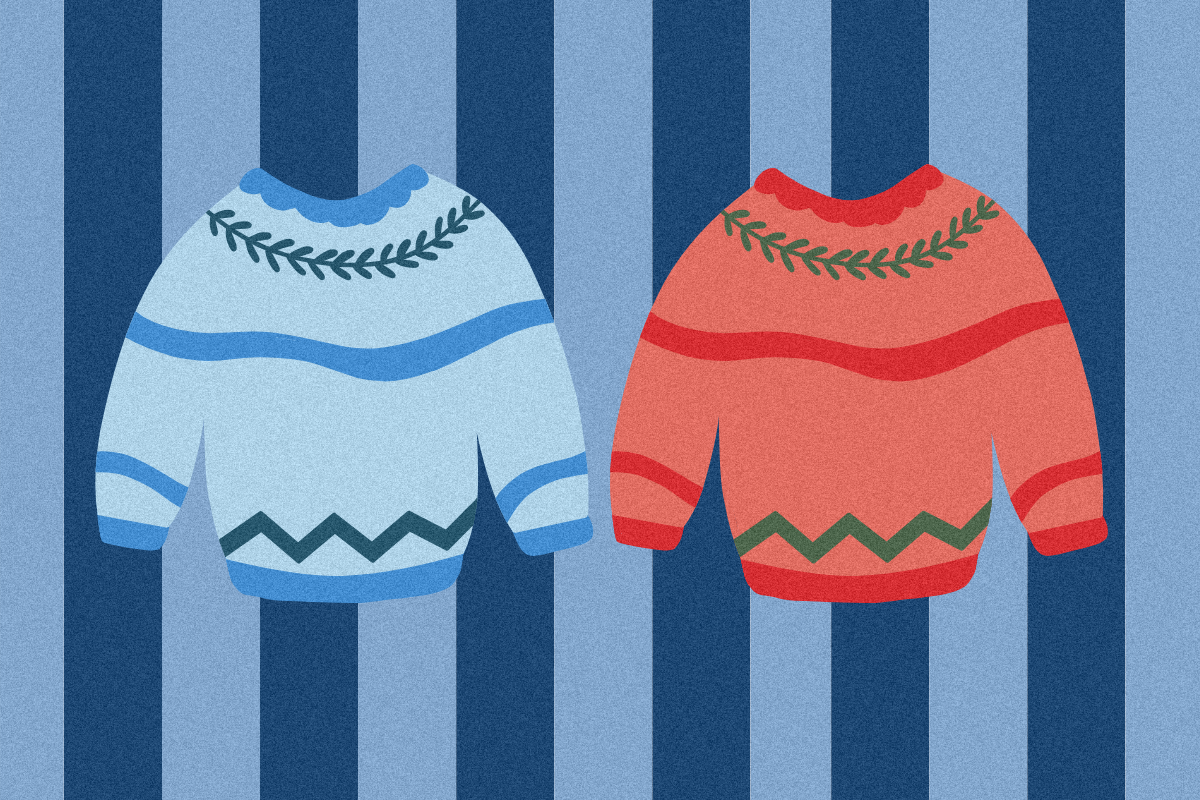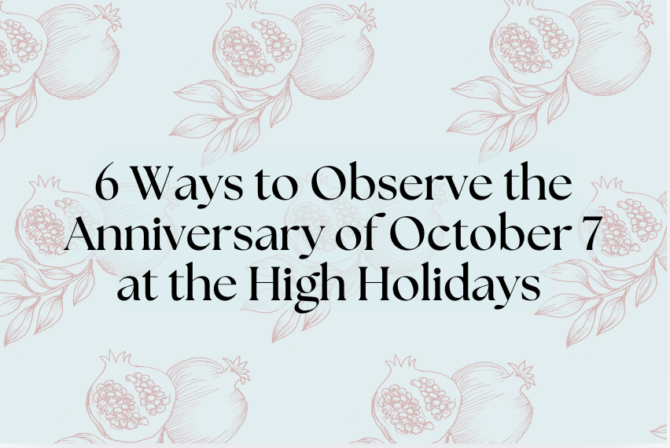My husband Daryl and I met in Chattanooga in our late 20s. The following year, at Christmas, I agreed to accompany him to his parents’ home in tiny Bradford, Tennessee, four hours west of our home, for a three-night stay. My “holidays” had always meant Hanukkah at my parents’ home in Atlanta with my sister and brother: a quick lighting of the menorah, a meal of brisket and potato latkes, and a smattering of small gifts exchanged. While Hanukkah proper lasted eight days, our celebration lasted about two hours.
Christmas at Daryl’s parents’ will be so fun! I remember thinking. And then we got there.
Daryl’s parents were kind enough, but from the moment we arrived, I felt my strangeness — that is, my Jewishness — acutely. Entering their home was like falling into a Christmas diorama at the mall. In the living room was an enormous tree, lopsided with ornaments and slathered in lights. Underneath was a cornucopia of elaborately wrapped gifts and Santa figurines. Ceramic Christmas villages, with their quaint, snow-covered cottages and warmly-lit churches and stores, occupied every bit of shelf space from living room to bedroom to bathroom. On the coffee table a procession of wise men and camels snaked around Guideposts magazines and bibles. And in the kitchen, a ham luxuriated in the oven, perfuming the house with the scent of unkosher delight.
After dinner, a tricky endeavor whereby I tried to avoid both the unkosher and the fattening, we opened gifts. As I recall, I received a wallet, a sweater, fleece slippers, a subscription to Cooking Light and a hefty stocking full of Paul Mitchell hair care products (Daryl’s mother was a beautician). Then we settled in on the sofa and the recliners for two full days and nights of television Christmas movies and specials, punctuated only by trips to the kitchen for meals and snacks, and a shameless amount of public co-napping.
I wanted to love the warmth, the novelty, the family-ness of it all. But I didn’t. I was terrifyingly bored. It was hard to find things to eat that weren’t pork or that didn’t merge meat with dairy. The daily newspaper seemed riddled with proverbs. I missed my house, my bed, my refrigerator, my routine.
The second day we were there, I started to cry. I cried after breakfast, after lunch, after dinner and in bed at night. I tried to explain myself to Daryl, who was understandably perplexed, but I didn’t know exactly what was wrong. I just knew I felt unmoored, that I was lonely, and that I was profoundly sad. Whatever I had thought might transpire — maybe I’d find a loving presence in Daryl’s father, to plug the hole my own father’s death the year before had left; maybe I would find in Christmas a cocoon of comfort that Hanukkah never offered — was grossly eclipsed by the awfulness of how I felt.
I wish I did not have to write this, but it’s the truth: For the next 20 years, the two months leading up to Christmas were marked by angry, tearful fights. I did not want to go to his parents ever again, but understood that not going would be a slap in the face to everyone. And so every year, I went. And every year, I marathon-cried. Eventually I traded marathon crying for marathon sleeping. And finally, after more years than I’d like to admit, we learned to compromise: We’d spend just one night at his parents’, and in return I would not cry at all.
And then, finally, we decided to host the holidays ourselves.
Daryl and I are in our 60s now. Fifteen years ago, we created what has become our — and our family’s — most looked-forward to event of the year: a mash-up of Christmas and Hanukkah at our home in Chattanooga, with Daryl’s mother (his father died seven years ago), my mother, my brother and his children, and 10 of our closest friends. We have a small silver tree, elaborately hung with many of his parents’ favorite ornaments, and a menorah I made in my wood shop. We love everything: the planning, the decorating, the shopping and cooking, but most of all, we love sharing the day with all of our favorite people.
It would be years before I would understand the despair I felt at Daryl’s parents’ house. The problem was not, as I’d thought, that there was too much down time, or too much television, or not enough food I could eat. It wasn’t that the newspaper was preachy or that we were all sleepy or that whatever I thought might happen as a result of me offering myself up to the magic of a new love’s family Christmas didn’t happen.
The problem was that I felt my presence there — bathed in the red-green glow of Christmas lights, tearing through a precarious tower of gifts, napping enthusiastically in a room full of bibles — was somehow a repudiation of my Jewishness. Hadn’t my parents, year after year, marched into my elementary school and demanded I be excused from singing Christmas songs? Hadn’t they tried hard to instill Jewish values by sending me to Sunday school and Hebrew school, and hauling me off to synagogue for the High Holidays? Hadn’t I already hurt them enough by refusing to become a bat mitzvah, and now, by falling in love with a gentile?
Wasn’t my attendance at Christmas like thumbing my nose at them, and, by extension, at all the Jews who had fought and died for my right to religious freedom?
Wasn’t it the least I could do to be miserable?
Well, no. No, my attendance at Christmas was not a repudiation of my faith, or my parents, or my ancestors. My despair, impressive as it was in scope and expression, was unnecessary, the product not of guilt or apology, but of failure of thought: an inability to see that, of course, the trappings of Christmas and Hanukkah — the lights, the food, the presents — are not the meat and bones of faith, and that, of course, my Jewishness cannot be extinguished by simple exposure to ham or proverbs. Mine was a shadow war whose enemy was not Christmas or the enticements of assimilation, but an inability to understand what those who fought for religious freedom understood: that faith is always an inside job, an eternal flame.
It’s that time of year again, when my husband and I begin planning for the celebration at our house. A lot has changed since we took over the hosting. In addition to losing Daryl’s father, we lost a dear friend to a heart attack, and Daryl’s elderly aunt and uncle to illness. One couple divorced, and the wife moved away from us. And my mom has Alzheimer’s, and is unable to attend. We mourn these losses even as we are grateful for those still with us, and it is in this spirit of gratitude that our faith — in friendship, in the importance of celebration and in the sanctity of our shared and divergent beliefs — shows itself most clearly.








